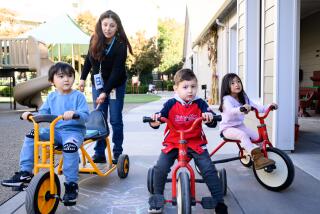Preschoolers Are Pushed Too Fast, Educators Warn
- Share via
WASHINGTON — Preschools are pushing children too hard and too early and it is leading to stress, depression, burn-out and learning problems in childhood, two major education organizations have warned.
The problem of the scholastic “force-feeding” of preschoolers has become particularly acute over the last decade, as school officials and parents push for earlier academic programs and the number of children ages 3, 4 and 5 attending school skyrockets, officials from the organizations said.
“Education is being conceived of as a race, and if you start early you’ll win that race . . . (but) it is stressful for children,” said David Elkind, president of the National Assn. for the Education of Young Children.
Elkind’s organization has adopted a strong position. It is urging preschools to reduce their emphasis on teacher-oriented, academic lessons and allow children to learn under less stress--by initiating their own activities, talking with people and solving problems such as balancing blocks or putting together puzzles.
Doubled in Number
The statement was prompted by a growing body of research on the subject and a doubling of the number of children ages 3 and 4 who have entered school since 1970. It was released Friday in conjunction with the National Assn. of Elementary School Principals as part of a conference attended by 60,000 educators.
The warning comes at a time when public schools are under increasing pressure to provide all-day kindergarten and preschool programs, and as the number of working mothers and single-parent families creates additional demand for such programs. There also are other forces at work: a growing number of disadvantaged children to whom early education is considered essential for success later in life, and a wave of “yuppies” looking for early academic prowess in their children.
Elkind said that these pressures and findings of research done in the 1960s, indicating the academic potential of young children, have led many preschools to teach a watered-down version of curricula from the first, second and third grades.
“With increasing numbers of young children being exposed to these inappropriate teaching methods, there is a real danger that large numbers of young children will experience learning problems at an age when, in the past, most children were not even in school,” Elkind said.
Four Danger Signals
The problem affects private as well as public preschools and kindergartens and children of every socio-economic category, he said.
He asked these questions to help parents recognize inappropriate programs:
--”When your 4-year-old goes to school, does she bring home dittoed work sheets, or her own artwork?”
--”Is her learning limited to memorizing the alphabet and reciting the numbers, or is her thinking challenged by being read stories, taking field trips or planting a garden?”
--”Does she come home quiet and withdrawn, or joyful and talking a mile a minute about her school?”
Elkind and Samuel G. Sava, executive director of the elementary principals organization, made it clear that they were not criticizing all early education efforts or all working parents whose children are cared for outside the home.
More to Read
Sign up for Essential California
The most important California stories and recommendations in your inbox every morning.
You may occasionally receive promotional content from the Los Angeles Times.










